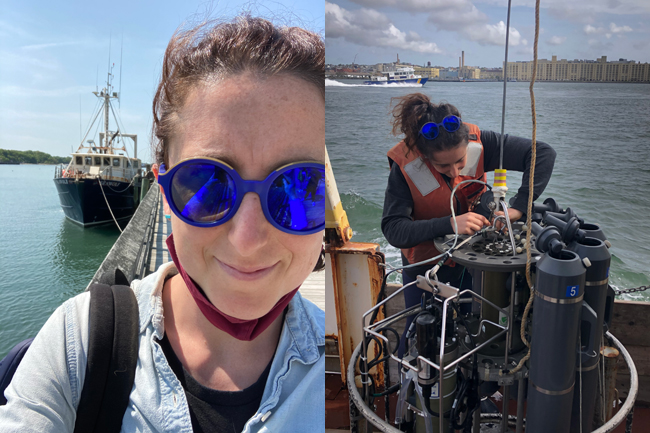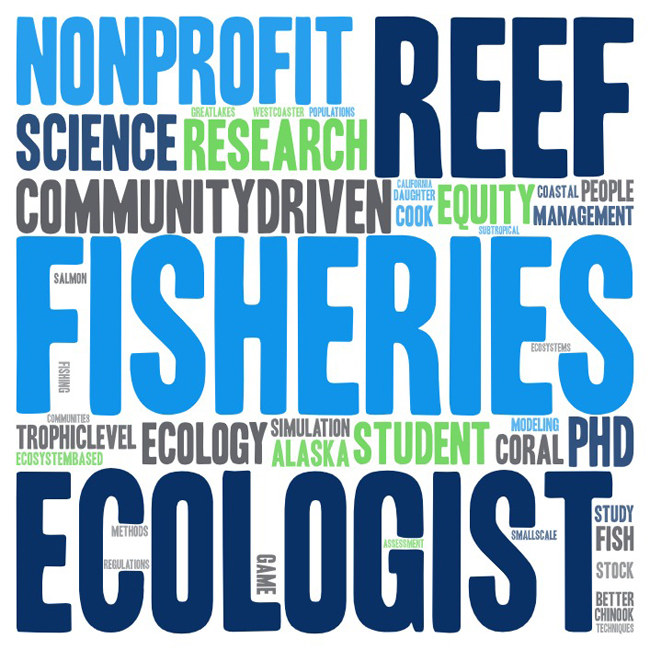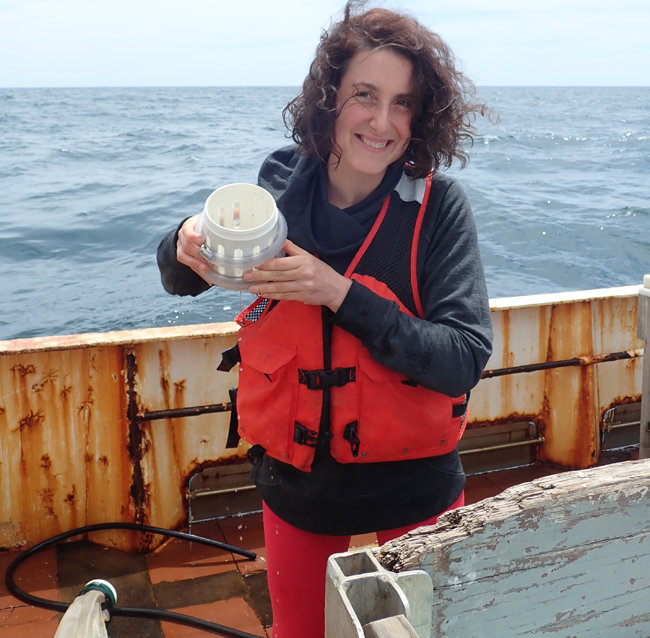
(At left) Sarah Weisberg with the R/V Seawolf, the flagship research vessel of Stony Brook University's School of Marine and Atmospheric Sciences, in the background; (At right) Weisberg operates a CTD (Conductivity, Temperature, and Depth) device, which measures the physics and chemistry of the water column. The data are used to understand how increasing carbon dioxide in the atmosphere is affecting local ocean chemistry—and perhaps making New York waters less hospitable to certain marine life. Credit: Ellie Heywood
— By Chris Gonzales, Freelance Science Writer, New York Sea Grant
Stony Brook, NY, August 12, 2022 - New York Sea Grant (NYSG) congratulates Sarah Weisberg, a 2022 National Marine Fisheries Service (NMFS)-Sea Grant Joint Fellowship recipient. Sarah hails from a New York institution—Stony Brook University—and will be supported by NYSG. She has earned one of the eight fellowships awarded this year through this national program. As with six of the others, her award will focus on fish population and ecosystem dynamics. In addition, one marine resource economics fellowship will be awarded.
Since 1999, the NMFS-Sea Grant Joint Fellowship program has trained the next generation of specialized experts in fisheries management. The program addresses the critical need for future fisheries scientists with expertise in stock assessment by supporting students pursuing doctoral degrees in related fields.
The field of population and ecosystem dynamics is vital to making high quality fishery stock assessments in order to properly manage U.S. fisheries.
“New York Sea Grant is excited to congratulate Sarah on her selection as a 2022 NMFS–Sea Grant fellow!” said Becky Shuford, director of NYSG. “As one of only eight doctoral students awarded this highly-competitive fellowship experience, Sarah’s timely research incorporates climate information to inform responsive, integrated ecosystem-based approaches to fisheries management. In this work of direct application to NOAA Fisheries’ efforts, she will contribute to the leading-edge body of knowledge needed to inform proactive, anticipatory science-based management of our Nation’s trust fisheries resources. Furthermore, Sarah will gain real-world applied experience that will be of benefit to her career development, to the future fisheries workforce, and to the resilience of fishing communities that rely on access to sustainable, living marine resources in the face of ecosystem change.”
“Through the NMFS–Sea Grant Fellowship Program, this year’s class of talented fellows will advance their scientific and technical skills while informing current sustainable fisheries and environmental management challenges,” said Jonathan Pennock, Ph.D., National Sea Grant College Program director. “We are excited to welcome the incoming fellows and see where their research interests will take them in the future.”
Weisberg’s project is entitled, “Advancing climate-informed, ecosystem-based fisheries management through food web modeling, indicator development and risk analysis in the rapidly warming Gulf of Maine.”
She is working on understanding how human-caused climate change can alter fish distribution and abundance. Ultimately, she seeks to know how an ecosystem’s overall properties, like resilience and efficiency, emerge from species-specific numbers.
“We hear a lot about resilience these days,” said Weisberg. “It’s perhaps even become a buzzword—and with good reason, since climate change is putting both social and ecological systems under intense stress. My research focuses on developing quantitative indicators of ecological resilience, specifically in the Gulf of Maine, and probing how we can use these indicators to inform fisheries management.”
Her faculty advisor is Janet A. Nye and her mentor at the National Oceanic and Atmospheric Administration (NOAA) is Sean M. Lucey.
Fellows are chosen through a competitive process that involves national review by an expert panel. The 2022 fellows are geographically diverse, attending universities in Alaska, California, Florida, Michigan, Massachusetts, New York, North Carolina and Washington. Some of the words they use to describe themselves and their work appear in the word cloud below.

A square word cloud of words that the 2022 NMFS-Sea Grant Fellows use to describe themselves and their work.
Since the NMFS-Sea Grant fellowship began, it has supported over 100 population and ecosystem dynamics and 38 marine resource economics doctoral fellows. Alumni of this fellowship typically hold future positions in NOAA Fisheries, other agencies, academics and fishery management councils.
To learn more about the field of fisheries management and how experiences like the NMFS-Sea Grant fellowships address the need for career development opportunities in this specialized field, see this report to Congress and this academic paper.
More Info: Why SBU's Nye Lab Monitors the New York Bight

Sarah Weisberg is holding the bottom of a plankton net—a large net for catching the small critters that drift in surface oceans and are key links in the marine food webs—as part of an effort to gather data aboard the R/V Seawolf. Credit: Ellie Heywood
Through a long-term project with the New York State Department of Environmental Conservation (NYS DEC), Sarah Weisberg is also part of a team monitoring the physical, chemical, and biological conditions of the New York Bight, a triangular indentation along the Atlantic Coast extending roughly from New Jersey to the eastern tip of Long Island. A bight is a bend in the coastline or a very shallow bay.
The three principal investigators on the project are Lesley Thorne, Joe Warren, and Janet Nye. Weisberg is working in the Nye Lab. As part of this larger monitoring program, Weisberg collects ichthyoplankton (fish embryos and larvae), uses DNA barcoding to identify them to the species level, and then uses the data to estimate the thermal niches of these early life stages of fish.
The broader goal is to better understand how ocean warming is impacting fish across their entire life cycle.
Note that Weisberg actually will be working on another, separate project for the NMFS-Sea Grant Fellowship. In this photo she is holding the bottom of a plankton net—a large net for catching the small critters that drift in surface oceans and are key links in the marine food webs.
More Info: New York Sea Grant
New York Sea Grant (NYSG), a cooperative program of Cornell University
and the State University of New York (SUNY), is one of 34 university-based
programs under the National Oceanic and Atmospheric Administration’s
National Sea Grant College Program.
Since 1971, NYSG has represented a statewide network of integrated
research, education and extension services promoting coastal community
economic vitality, environmental sustainability and citizen awareness
and understanding about the State’s marine and Great Lakes resources.
Through NYSG’s efforts, the combined talents of university scientists
and extension specialists help develop and transfer science-based
information to many coastal user groups—businesses and industries,
federal, state and local government decision-makers and agency managers,
educators, the media and the interested public.
The program maintains Great Lakes offices at Cornell University, SUNY
Buffalo, SUNY Oswego and the Wayne County Cooperative Extension office
in Newark. In the State's marine waters, NYSG has offices at Stony Brook
University in Long Island, Brooklyn College and Cornell Cooperative
Extension in NYC and Kingston in the Hudson Valley.
For updates on Sea Grant activities: www.nyseagrant.org has RSS, Facebook, Twitter, Instagram, and YouTube links. NYSG offers a free e-list sign up via www.nyseagrant.org/nycoastlines for its flagship publication, NY Coastlines/Currents, which is published quarterly.